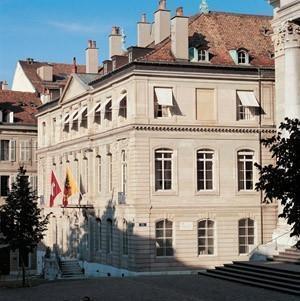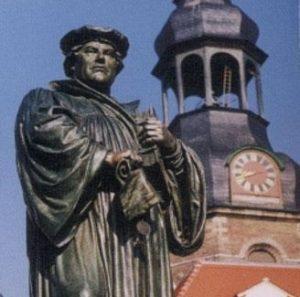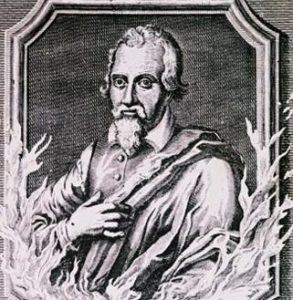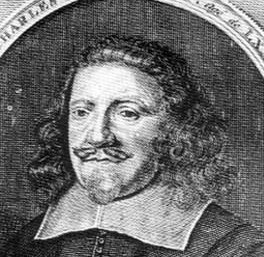Little attention was drawn to the Reformation until 1717
Although in the Holy Roman Empire a Reformed prince had celebrated a jubilee of the Reformation in 1617, there was little enthusiasm to do so anywhere else in Europe.
In Geneva in 1617, Théodore Tyronchin (1587 – 1657), rector of the Academy, mentioned the jubilee of the Reformation when he addressed his 1617 generation of students. He gave a history of jubilees celebrated since the ancient games of Antiquity and denounced the corrupt practice of the Roman Catholic Church which consisted in using jubilees as a means of enriching the Pope. He then spoke of the two reformers Luther and Zwingli with great admiration. Little by little Geneva moved towards an official jubilee celebration. In August 1635, there was a commemoration of the day in 1535 when the Councils of the Two Hundreds abolished the Catholic mass, although it was not a public event. In connection with this, Frederic Spannheim (1600 – 1649), Rector of the Academy, Professor of theology, published a treatise: Geneva restà nouveau tuta: in which he considered that the jubilee was the hundredth anniversary of the birth of Geneva as a Republic, a Church and an Academy; with the Reformation of 1535 light had come after a period of darkness. (He drew a parallel between the jubilee of the Reformation and the ‘ancient games of Antiquity ‘which had been held to celebrate the birth of Rome).
Following the example of the jubilees in Germany in 1717, 1817, and 1883, Zurich and Berne, together with some other towns, held their own jubilees on dates which commemorated key events of the Reformation and quite ignored Luther’s theses posted in 1517.
At first, the Swiss mostly celebrated the dates when their towns had turned to the Reformation away from Catholicism.
The second Lutheran jubilee in 1717 seems to have set in motion the Reformation jubilees in Switzerland as a reaction to Lutheranism. The first jubilee celebrated Zwingli in Zurich on 1st January 1719, the anniversary of his first sermon in Zurich Cathedral. The people of Berne, having just celebrated their victory over the Catholics in 1712, commemorated the Reformation triumphantly in 1728.
Geneva followed suit, but in 1735. On the 21st August 1735 there was a major jubilee of the Reformation: it was a national festival, well prepared in advance with sermons specially adapted to the occasion, a prayer written by Jean-Alphonse Turrettini inspired by the event, a parade which consisted of pastors, professors and town magistrates, special illuminations and a banquet.
Celebrations of Zwingli
The Wartburgfest (festival of Wartburg) of 1817 inspired the students of Zurich and Berne to have their own celebration: on the 23rd October 1818 they gathered together for the three hundredth anniversary of the date when Zwingli had come to preach in Zurich and marched to the place where he had been killed; they also founded a student union which advocated a Federal Liberal State (Zofingue). However Zwingli’s official jubilee was still fixed on the 1st January 1819, and others followed: in Berne (1828), Bâle(1829) and Neuchâtel(1830).
The Genevan jubilee of August 1835 was similar to the one held a hundred years previously. However its motto: ‘Religion – Fatherland – Tolerance’ expressed reserve of over-confessionnalism. This was because the new boundaries of the canton now included Catholic communities so the State Council was not allowed to mention either Protestantism or Catholicism in its decisions any more.
Zwingli was clearly considered to be the founding father of the Swiss Reformation from 1818 onwards. As a reaction to the great number of Lutheran jubilees in the XIXth century, Switzerland wanted to insist on the fact that other ‘Father Founders’ had existed too.
In 1884 – the anniversary of Zwingli’s birth, was the occasion for Zurich to hold a jubilee in the same manner as Luther’s birth in 1883 (but not on the grand scale of the jubilees in Germany), followed by the solemn inauguration of a monument to Zwingli on the 15th August 1885.
Celebrating Calvin in Geneva was not an easy matter
The Commune of Geneva preferred to vote for a celebration of the date when their city had accepted the Reformation rather than for Calvin the Reformer.
Jean-Henri Merle d’Aubigné (1794 – 1872), a historian of the Reformation, an admirer of Calvin and Pastor of the Free Church of Geneva, had been a student in Germany. During this time and afterwards too he had admired the various different celebrations of Luther held in that country. Inspired by their example, in 1861, he put forward the idea of commissioning a special building which was to be a memorial to Calvin in Geneva. It was to be used ‘for some useful purpose’, notably for public lectures in the cause of evangelization. In theory, the approaching three hundredth anniversary of Calvin’s death was supposed to speed up the process of its construction. However, it was only possible to inaugurate the plot of land on which it would be built on the 24th May 1864. No mention whatsoever was made of a ‘Calvin jubilee’ (let alone the 300th anniversary of his death). And nor was there any reference to it at the inauguration of the ‘Reformation Hall’ in 1867.
The Luther jubilee of 1889 also inspired the Protestant Church of Geneva to make a similar celebration for the 400th anniversary of Calvin’s birth (1509 – 1909). However, due to the fact that Calvin had condemned Michel Servet to the stake, his popularity was at a very low ebb in Geneva, a city renowned for its tolerance. He was certainly not a model of freedom and the rights of man so Protestantism and Calvinism in particular were little appreciated at the time. In order to forestall a negative reaction on behalf of the city of Geneva, Emile Doumergue, Dean of the Protestant Theology Faculty of Montauban and a great advocate of Calvin’s work, put forward an idea. This was to set up an expiatory monument in memory of Michel Servet in 1903, on the 350th anniversary of his death, just 6 years before the Calvin jubilee and the inauguration of the Reformation monument.
This led the way for a project to set up a ‘monument to the Reformation’ which would not only celebrate Calvin, but also other reformers and heroes who had defended the rights of man and the rights of their own people.
Now that the expiatory monument had restored Calvin’s popularity and his black deeds had been forgiven for all time, three jubilees were celebrated in his honor in July 1919: the first was held by the National Protestant Church of Geneva, which had just been separated from the State (from the 2nd to 4th and from the 6th to 7th of July; the second was held by the College (on the 5th of July)and the University (from the 7th to the 10th of July).
In 2009, year of the 500th anniversary of Calvin’s birth, there were many celebrations, events both religious and non-religious events organized by the Civic authority for local inhabitants. The brand new International Museum of the Reformation in Geneva did much to raise enthusiasm for the celebrations and help to bring them about.








